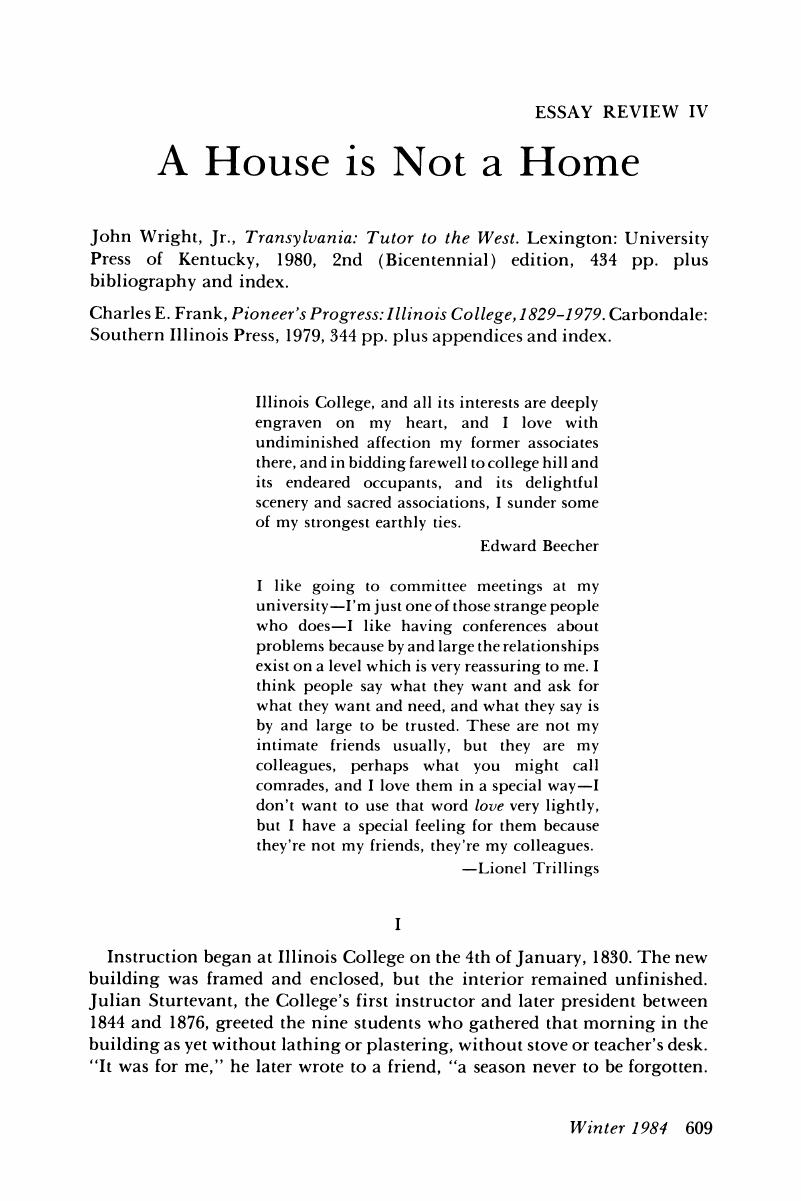No CrossRef data available.
Article contents
A House is Not a Home
Published online by Cambridge University Press: 24 February 2017
Abstract

- Type
- Essay Reviews
- Information
- Copyright
- Copyright © 1984 by History of Education Society
References
Notes
1. Beecher, Edward, as cited in Frank, , p. 34. Page reference to the Wright and Frank volumes will be furnished as necessary in the body of the text. Lionel Trilling's remark can be found in “Sincerity and Authenticity: A Symposium,” Salmagundi, 41 (Spring, 1978): 101–102.Google Scholar
2. Doyle, Don Harrison, The Social Order of a Frontier Community: Jacksonville, Illinois (Urbana, 1978).Google Scholar
3. Rudolph, Frederick, The American College and University: A History (New York, 1962), pp. 110–135.Google Scholar
4. Cf., e.g., McLachlan, James, “The American College in the Nineteenth Century: Toward A Reappraisal,” Teachers College Record, 80 (December, 1978): 287–306; Palmieri, Patricia A., “Here Was Fellowship: A Social Portrait of Academic Women at Wellesley College, 1895–1920,” History of Education Quarterly, 23, (Summer, 1983): 195–211; and Katz, Michael B., “The Role of American Colleges in the Nineteenth Century,” Ibid., p. 215.CrossRefGoogle Scholar
5. Wittgenstein, Ludwig, Zettel, Anscombe, G.E.M. and von Wright, G.H., eds., Anscombe, G.E.M., trans., (Berkeley and Los Angeles), p. 43e.Google Scholar
6. Peter, Robert and Peter, Johanna, Transylvania University: Its Origin, Rise, Decline and Fall (Louisville, 1896); Sonne, Neils Henry, Liberal Kentucky, 1780–1828 (Lexington, 1939); Jennings, Walter Wilson, Transylvania: Pioneer University of the West (New York, 1955); Hopkins, James F., The University of Kentucky: Origins and Early Years (Lexington, 1951); Wade, Richard C., The Urban Frontier: The Rise of Western Cities, 1790–1830 (Cambridge, 1959).Google Scholar
7. Sonne and Wade drop the curtain with the Holley episode. Jennings acknowledged the new Transylvania in his concluding paragraph, but he left open the question of the relationship between the old school and the new. Before Hopkins' book appeared, Clark, Thomas D., then Chairman of UK's History Department, wrote: “The foundation of the Transylvania Seminary in 1780 in one sense of the word marks the beginning of a chapter in the history of the University of Kentucky.” (“The History of the University of Kentucky,” unpublished typescript, 1949, UK Special Collections). In 1965, 100 years after Kentucky University was consolidated with the old Transylvania, UK celebrated its centennial year, and the Kentucky Alumnus, 36 (1965) saw fit to begin its list of “Significant Dates in the History of the University of Kentucky” with old Transylvania's founding in the 1780s.Google Scholar
8. Our understanding of the ways in which Transylvania was used as a board piece in strategic games of power and prestige by antagonistic elements among the school's trustees, the Lexington City Council and the legislature has not advanced beyond the pioneering point where Sonne left the matter in 1939. Following Sonne, Wright acknowledges these politics in his treatment of the Holley episode, but he drops the theme in his account of events after 1828. He sacrifices, as a result, the possibility of real continuity between Holley's resignation and the resignation of Benjamin Orr Peers in 1833, for example. From the standpoint furnished by Ronald Story in The Forging of an Aristocracy: Harvard and the Boston Upper Class, 1800–1870 (Wesleyan, 1980), it looks as if the Lexington elite tried but ultimately failed to capture Transylvania in ways that the Boston elite succeeded in capturing Harvard during the same period. Certainly a sharper focus on the town of Lexington, as well as the socio-economic origins of the students, would have given some real content to “The West” in Wright's title.Google Scholar
9. As Frank Kermode observes, “there are constraints that shadow interpretation; and the first is genre. Of course we can say these constraints are disagreeably ideological. We can even pretend they aren't there.” See his Genesis of Secrecy: On the Interpretation of Narrative (Cambridge, 1979), p. 18. Cf., Fish, Stanley, Is There A Text in This Class: The Authority of Interpretive Communities (Cambridge, 1980); and Cavell, Stanley, Pursuits of Happiness; The Hollywood Comedy of Remarriage (Cambridge, 1981), particularly the opening chapter, “Words For A Conversation.” Google Scholar
10. Genre would lead us in a somewhat different analytic direction from “saga” as proposed by Thelin, John R. in Higher Education and Its Useful Past (Cambridge, 1982), but I think the results would be complimentary.Google Scholar


